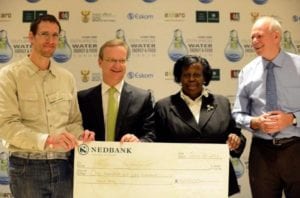Nedbank CEO Mike Brown, together with Deputy Minister Mabudafhasi, jointly handed over a cheque for a R150 000 to Dr Heinrich Badenhorst, for winning the Nedbank SAWEF Scholarship for Water-Energy-Food Nexus Research.
Brown commented: “Through the provision of this scholarship we are pleased to be playing an active role in the facilitation of new learning and research and supporting the SAWEF philosophy of dialogue leading to action.” Dr Badenhorst works fulltime at the University of Pretoria’s Chemical Engineering Department, which he joined after completing his Ph.D. in Chemical Engineering, working on nuclear graphite materials. His project, entitled Carbon and Graphite for Solar Energy Capture, uniquely captures the innovative and out-of-the box thinking called for when confronting multifaceted challenges such as those contained in the convergence areas of the nexus. Dr Badenhorst’s research hinges on tweaking the design and function of parabolic troughs used in concentrated solar power. These parabolic mirrors focus the solar energy onto a central receiver. Traditionally these are comprised of an oil-filled glass tube with an outer absorbent coating. Dr Badenhorst explains:“Carbon black is an excellent absorber of electromagnetic radiation and is employed in stealth planes to avoid radar detection. However, carbon black has a very poor thermal conductivity. Our innovative solution to this is to combine carbon black and highly conductive natural graphite powder. This composite can
be directly placed in the central receiver to collect and conduct the solar energy to a storage unit, like a molten salt container. Both carbon black and graphite are highly inert and have low thermal expansion, thus making them ideal for this application. This setup would negate the necessity for high temperature and high pressure oils and accompanying pumps, seals, etc.” Dr Badenhorst emerged victorious after a call-to-entry campaign launched in February this year followed by a gruelling month-long screening process, conducted by the Water Research Commission, delivered a short-list whittled down to three applicants. The top three applicants had their research proposals evaluated by an independent adjudication panel convened by Professor Anthony Turton, and including Dr Ana Cascao, Stockholm International Water Institute, Ms Mpetjane Kgole, Eskom, Mr Dhesigen Naidoo, CEO of the Water Research Commission and Dr Marco Lotz, Nedbank’s Sustainability Carbon Specialist. The panel’s decision, based on a points system compiled from independent adjudication sheets, a face-to-face interview with each finalist and grading of their final presentation at SAWEF 2013, delivered a unanimous verdict. However, the other two finalists, Dr Daniela Bezuidenhout also at the University of Pretoria and Rudi Scheepers of UCT, both presented research proposals indicative of a healthy well of scientific talent residing in South African universities and research institutions and will no doubt achieve unbridled success in their own right.






